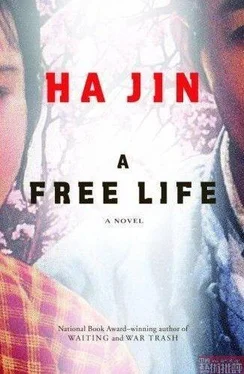"How often did you go to the bathhouse?" "Usually once a week. There's too many people everywhere." "Where did you live-I mean, in what kind of housing?" "We have one room."
"Like a studio with a kitchenette and a bathroom in it?" "No, just one room."
"Really? Do most Chinese live like that?" "Some people."
"My goodness, I guess my house can accommodate a hundred Chinese." Heidi tittered, a hacking noise in her throat.
"Not true," Pingping said, coloring. " Nan 's parents live in four-bedrooms apartment, and my younger brother have three huge rooms for his family."
"I was just kidding." Heidi smiled, rather embarrassed. She sloshed the wine around in her glass and took a mouthful.
Nan was amazed that Pingping, despite her preference for American life, would be so sensitive about Heidi's casual remark. She and he often complained about China in harsh language between themselves, but to Pingping, others mustn't say anything unjustifiably negative about their native land without giving offense. If only he and his wife could break off with China altogether and squeeze every bit of it out of themselves!
Heidi turned to Nan. "What's the major difference to you?" She narrowed her eyes as if sleepy.
"In China every day I wanted to jump up and fight wiz someone. On buses, in restaurants, and in movie theaters, anywhere I went, I wanted to fight. Zere you have to fight to survive, but here I don't want to fight wiz anyone, as eef I lost my spirit."
"It's true," Pingping put in. "He's real fighter in China."
"I don't understand." Heidi shook her fluffy, slightly grizzled head. "You mean you're more peaceful or more oppressed here?"
"I can't tell for sure," he said. "Back in China I knew how to deal wiz bad guys, so I eizer confront them or avoided zem, but here I can't fight anyone. I'm not sure how far I can go, where to stop."
"That's strange."
Pingping added, "What big temper he used to have. He's more like gentleman now. Some Chinese men are mean, think themselves superior than women. They treat their wife like house servant."
"A lot of American men abuse women too," Heidi said.
Nan didn't comment, lost in thought. What good would fighting and yelling do here? Who cares what noise I make? The louder I shout, the bigger a fool I'll make of myself. I feel like a crippled man here.
Pingping kept on, "I glad Nan stopped mix with his Chinese friends. When they're together, they talk nothing, only politics. How to save the country, how to run government, how to take Taiwan back, how to beat Japan, and how to deal with USA. Everybody like prime minister or something."
Heidi tittered while Nan grimaced, knowing his wife wasn't totally wrong. Heidi had by now emptied the whole bottle of wine. Before dinner she had heard from Pingping about the factory's imminent move, so she asked Nan, "Are you going to look for another job?"
"Of coss."
"You have a master's, don't you?" "Yes, just got it."
"Do you want me to talk to the principal of West Oxford? I've known him for a number of years. They might need someone to teach Chinese."
Nan hesitated, unsure if he should express his interest. He didn't have a degree in Chinese, and that preparatory school might not consider him at all. He had looked for a teaching position in the language before and had been turned down again and again on the grounds that his specialty was political science. Pingping said, "Thank you, Heidi. I don't think Nan should teach little kids. He has best mind in our generation, a published poet in China. People know him like scholar."
Nan remained silent, moved but also abashed. He thought about his wife's words. She talked as if they were still in China. They were in America now and had to compromise.
He looked at Pingping and then at Heidi. His wife kept a straight face, blushing up to the ears, while Heidi, tipsy, simpered vaguely.
A LETTER from Nan 's parents arrived two weeks after Thanksgiving. His father wrote that Nan shouldn't be too paranoid and that they had indeed found in the envelope a thick hair, which they could tell belonged to nobody but their oldest son. This verification enraged Nan, because in fact he had not enclosed a hair in his letter at all. The mail examiner must have put in a substitute. Now, Nan was convinced that he was blacklisted. Unsettled, he tried to recall his conversation with Danning from a few weeks earlier so as to grasp the implications he might have missed. He was afraid that his trouble with the authorities might affect the careers of his siblings back home, one of whom, his younger brother, was a reporter at an official newspaper.
In the postscript his father wrote:
My son, I hate to reiterate this, but I ought to say it again. At home you could depend on your parents, but in America you are on your own and should make as many friends as you can. Remember, one more friend is one more way of survival. Don't put on airs and insulate yourself. Try to befriend as many people as possible. You don't know who may hold out a helpful hand in your hour of need.
The old bugger is full of crap! Nan said to himself. Here we're alone and can't possibly depend on friends for our survival. Besides, all the Chinese here have changed and become self-centered and won't share time and resources with others. Everyone is struggling to keep himself from sinking. It's not like in China, where you can attach yourself to a high-ranking official and live in a network of friends snugly as long as you make no waves and don't get ahead of others.
Nan had never been close to his father, who had looked down on him because as a college instructor, Nan couldn't get decent housing for his own family and had to live in a room borrowed from his father's beverage research institute. The old man often said to Ping-ping that Nan at most had a second-rate mind, but Pingping would counter, "He's better than you. He'll be a professor someday." Her father-in-law would hoot, far from offended, though he still called Nan "a born loser." On his fifty-sixth birthday five years before, the old man had excluded Nan from the dinner party because he had invited some important guests and was afraid that Nan, gauche and absentminded, might make a gaffe. Nan 's younger brother Ning, smooth-tongued and more outgoing, kept their father's friends company at the party. That hurt Nan. He didn't respect the old man, who lived in a network of officials and was nothing but an empleomaniac, foolishly perusing the histories of various dynasties, particularly the Ming and the Ching, to learn statecraft (or political trickery); this despite the fact that the old man was in charge of a department of only ninety people and was already close to retirement age. In private Nan called his father "a lifetime lackey."
The letter from home disturbed Pingping as well. She advised Nan to forgive his father and not to be annoyed. She even ventured, "He might have a point. You shouldn't continue to live like this."
"What can I do, eh?" asked Nan.
"Maybe go to school again?"
"To study what? Law or business or computer science?"
"I didn't say any of those. Why can't you specialize in something you like? You write in English better than most people. Why not put that to good use?"
"I need money for tuition. Nowadays there're so many Chinese students in America that schools don't give as many scholarships as before. After the Tiananmen massacre, who still wants to admit students from that ruthless country?"
"But it won't hurt to try."
They did have some savings, which both of them had agreed not to touch-they must keep some cash on hand in case of emergency, now that their child was with them. "I want to be a writer, to write many books," Nan muttered.
"In Chinese?"
"Of course."
"You'll have no chance if you do that." "Why do you say that?"
Читать дальше












